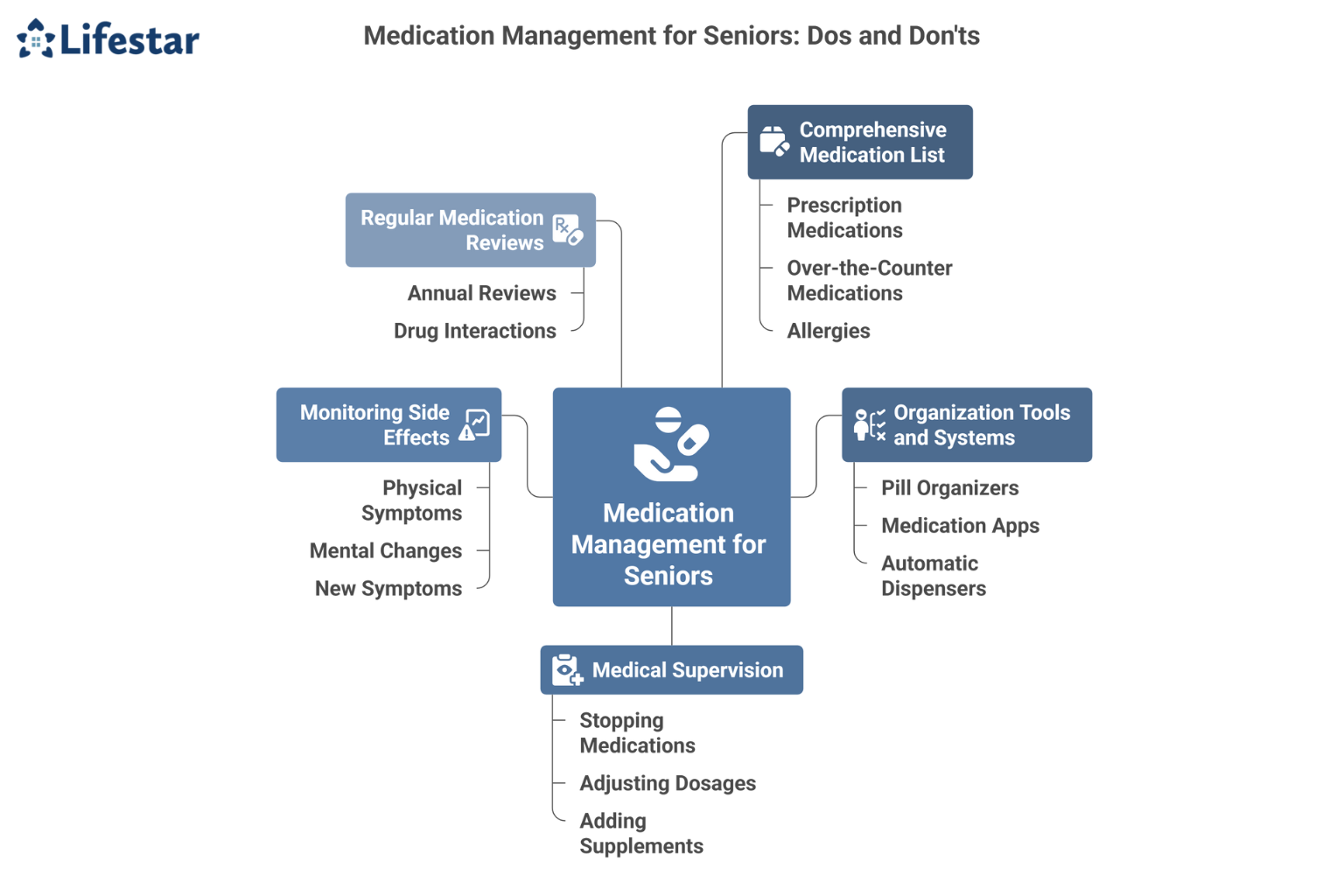
Table of Content
Managing medications for an aging family member can feel overwhelming, especially when multiple prescriptions are involved. Proper medication organization is crucial for maintaining your loved one’s health and preventing dangerous drug interactions. Here’s an essential guide to keeping your senior family member safe and healthy.
Do: Create a Comprehensive Medication List
Maintaining an up-to-date medication list is the foundation of safe medication organization. This list should include:
- All prescription medications with dosages and frequencies
- Over-the-counter medications and supplements
- Herbal remedies and vitamins
- Allergies and adverse reactions to medications
- Contact information for all healthcare providers
Keep copies in multiple locations—your loved one’s wallet, refrigerator, and car glove compartment. Share this list with all healthcare providers during appointments and update it immediately when medications change.
In-home care providers can benefit aging adults in a variety of ways. From cooking nutritious meals to offering timely medication reminders, the dedicated caregivers at Lifestar Home Care are available to help your elderly loved one 24 hours a day, 7 days a week.

Don’t: Allow Medication Hoarding or Sharing
Many seniors develop habits that can be dangerous to their health. Never allow your loved one to:
- Save leftover antibiotics or other prescription medications
- Share medications with friends or family members
- Continue taking expired medications
- Skip doses to “make medications last longer”
These practices can lead to treatment failures, drug resistance, or serious health complications. Families should also stay informed about the benefits and risks of wine for seniors to ensure safer health decisions. Dispose of expired or unused medications safely through pharmacy take-back programs or community disposal events.
Do: Use Organization Tools and Systems
Effective organization prevents missed doses and dangerous mix-ups. Consider these helpful tools:
- Pill organizers – Weekly or monthly containers with separate compartments for different times of day
- Medication apps – Digital reminders that alert your loved one when it’s time to take medications
- Automatic dispensers – Electronic devices that dispense the correct pills at scheduled times
- Pharmacy services – Many pharmacies offer prepackaged medication services that sort pills by date and time.
Choose the system that best matches your loved one’s cognitive abilities and daily routine. Simple solutions often work better than complex technologies for seniors who aren’t comfortable with digital devices.
If your senior loved one has been diagnosed with a serious condition and needs help with tasks like meal prep, transportation, medication reminders, bathing, and grooming, reach out to Lifestar Home Care, a leading provider of home care Oklahoma City families can trust. We also offer comprehensive care for seniors with dementia, Alzheimer’s, and Parkinson’s.
Don’t: Make Changes without Medical Supervision
Medication adjustments should always involve healthcare professionals. Avoid these common mistakes:
- Stopping medications because your loved one “feels better”
- Adjusting dosages based on internet research or advice from friends
- Adding new supplements without consulting doctors
- Switching between brand-name and generic medications without approval
Even seemingly minor changes can have serious consequences. Always consult with healthcare providers before making any modifications to your loved one’s medication routine.
Do: Monitor for Side Effects and Interactions
Regular monitoring helps you catch problems before they become serious. Watch for:
- Physical symptoms – Dizziness, nausea, unusual fatigue, or changes in appetite
- Mental changes – Confusion, memory problems, or mood alterations
- New symptoms – Any unusual symptoms that appear after starting new medications
- Worsening conditions – Signs that existing health problems aren’t progressing positively as expected
Keep a journal of symptoms and bring it to medical appointments. This documentation helps healthcare providers make informed decisions about medication adjustments.
Don’t: Ignore Regular Medication Reviews
Healthcare needs change as people age, making regular medication reviews essential. Avoid these oversights:
- Assuming all current medications are still necessary
- Forgetting to mention over-the-counter medications during doctor visits
- Skipping annual medication reviews with pharmacists
- Ignoring potential drug interactions when new medications are prescribed
Schedule comprehensive medication reviews at least annually or more frequently if your loved one sees multiple specialists. This process ensures all medications work together safely and effectively.
Proper medication organization requires attention and ongoing communication with healthcare providers. By following these guidelines, you can ensure your loved one receives the maximum benefit from his or her medications while minimizing risks and complications.
Whether you need respite from your caregiving duties or your aging loved one needs live-in care, Lifestar Home Care can meet your family’s care needs in Oklahoma City. Our dedicated caregivers are available around the clock to provide transportation to doctor’s appointments, ensure seniors take their prescribed medications, and help with a variety of tasks in and outside the home. Lifestar Home Care can be your trusted partner in caregiving for your aging loved one. Contact one of our experienced Care Managers today to learn more about our reliable in-home care services.